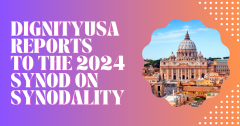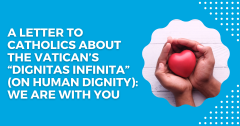An Open Letter to Catholics: The Church You Long For Already Exists!
Dear Fellow Catholics,
I have spoken with dozens of you in the days following the close of the much-touted Vatican sex abuse summit. To a person, you have expressed disappointment, frustration, sadness, anger, even disgust at the failure of this gathering to produce even the most minimal substantive universal policy change. As one of you said, “Even the greediest corporation gets the importance of going on record with a zero-tolerance policy when it comes to sexual abuse. Why can’t the church get its act together?”
And now you may be facing a dilemma. In truth, this is likely a revisiting of an internal dialogue you’ve had several times before, due to the abuse and cover-ups, or around other issues on which you have felt church leaders are in error. You dearly love your faith, the sacramental traditions of the church, the many good works it coordinates and inspires all around the world, and the many loving, holy people in your life with whom you share Catholicism.
You are also finding it increasingly difficult to affiliate with your parish, your diocese, the Catholic church as you know it. These organizations have repeatedly failed to address the sexual abuse of children, the decades of cover-up, and the pattern of putting other children and families at risk by placing known serial abusers in parish after parish. You may also be disillusioned by the ways the institution continues to perpetuate the oppression of women, exclude LGBTQ+ people from its full embrace, and fail to adequately attend to the spiritual needs of many of its members, who feel unheard, powerless, or even dismissed. You find it difficult or impossible to talk about this with others who worship with you—somehow, raising these issues just isn’t done. Yet, you don’t know where else to turn. No other denomination offers what you love about the practice of your faith.
I have good news for you. The Catholic church you long for already exists. It exists alongside the institutional church in a diverse and vibrant array of Eucharistic and spiritual communities rooted in Catholic tradition and values. They may be Dignity chapters, Women-Church communities, Intentional Eucharistic Communities, or communities pastored by Roman Catholic Womenpriests, CORPUS priests, C.I.T.I. priests, Federation of Christian Ministries members, or women and men from branches of Catholicism beyond those rooted in Rome, such as the Ecumenical Catholic Communion, Old Catholic Church, American Catholic Church, and more.
These often small, welcoming communities live out the core values of Catholicism—sacramentality, inclusion, justice, Gospel-based service—in myriad ways. They are lay-run and self-financed, have accountability structures, and rely on the labor and talents of their members for everything from setting up the chairs to developing and leading the worship. They understand the Priesthood of All Believers and know that God’s call to servant leadership is not limited by gender, age, ability, or marital or relational status. Most feature collaborative ministry teams of lay and ordained people, although the ministries of most of the ordained are not or are no longer recognized by the institutional church. Some of these communities have existed for a half century or more, while others are newer, sometimes springing out of the forced closures of parishes, the termination of a beloved employee who is gay, or the diocese’s imposition of a pastor who decreed an end to women’s or lay involvement in key roles.
I have been a member of one such group, Dignity/Boston, since 1982. This community has been my spiritual home for essentially my entire adult life. It is where I met my spouse on Easter night of 1994, where we celebrated our marriage, and where our children were baptized and first accepted Communion. These are the folks who supported our family through the grief of losing parents and siblings. This community, part of the national organization DignityUSA, which has existed since 1969, is marking 35 years of co-sponsoring the only program in Boston that feeds the hungry and homeless on Friday nights, and does so with an emphasis on the dignity and individuality of its guests. Our monthly second collections have contributed more than $750,000 to a vast array of community organizations that serve the most vulnerable, work on church reform issues, or respond to humanitarian crises. A group of about 50 regular members, Dignity/Boston sponsors a cycling team, “The Cardinal Sins,” which has raised well over $100,000 for HIV/AIDS for 16 years, and we’re already gearing up for this fall’s 17th event. Our cyclists have annually ridden 125 miles and our dedicated volunteers have staffed a rest area for this Boston-to-Provincetown ride. We also walk to end hunger, to fund cancer research and treatment, to improve treatment for our friends with arthritis, and for an end to violence in our city.
For almost 47 years, through public demonstrations, private meetings, and media appearances, we have tried to educate church leaders and members about the issues of LGBTQI Catholics and our families, witnessed against an array of injustices, buried too many of our members, and celebrated the many joyous milestones our community members have achieved. We have an elected board of seven community members, regular audits of our financial records, and a few annual community meetings where input is vocal and unedited. Our worship is led by women and men called by our liturgy committee. Sometimes this might be a single presider, sometimes a presiding team, sometimes formally ordained and sometimes not. It has not always been easy to figure out how to serve the diverse needs of our community, and tensions have flared at times. However, the Catholic faith is clearly alive, strong, and deep in this community, and we feel we are very much part of the Body of Christ.
Communities like these can, admittedly, be hard to find, as the institutional church has monopolized its brand and controlled the marketing. But, more and more, this is what Catholic looks like. So, my fellow Catholics, you don’t have to leave your faith behind. You just need to find the church you yearn for and deserve. The Good News is, it’s out there and the doors are open to you.
In hope and solidarity,
Marianne Duddy-Burke, Executive Director, DignityUSA





